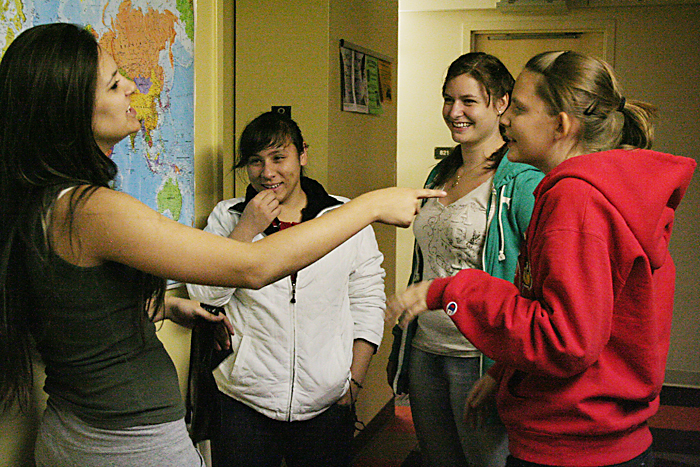- Tatiana Montanari,
Nutrition major from Brazil
 |
From left, Jéssica Fagherazzi (Brazil), Paola Morales (Puerto Rico), Mathilde Roudier (France) and Chlóe Deleplace (France), socialize in the residence area at the International House. (Photo by Stacey Garretson / Staff Photographer) |
After a three-year process of visa paperwork, proficiency exams, interviews with the U.S. consulate, and meetings with her university’s study abroad coordinator, Brazilian native Tatiana Montanari was grateful to finally arrive at ISU, lug all of her bags to the 8th floor of Manchester, and tape her Tru Blood poster up in her new home–the International House.
The 8th and 9th floors of Manchester, also known as the International House, or simply I-House, are home to over 250 international students. Established in 1970, the goal of I-House is fundamentally “to promote cross-cultural understanding,” according to its website.
Getting a dorm on one of these floors is extremely competitive. Well in advance, 23 year-old Montanari requested to live in I-House. Two weeks before she came to the U.S., she received an e-mail saying that many students wanted to live in those dorms and the school was not sure if they would have enough room to accommodate everyone. She pleaded with the school via e-mail, and luckily for her, was given a room.
After traveling all the way from Rio Grande de Sul, her hometown in the south of Brazil, nutrition student Montanari was thankful to have the support system that I-House offers.
“The international floor is very nice. I was kind of worried when I got here because you don’t know anybody; a totally different country, but I think everybody is on the same page so everybody talks to everybody, that’s what’s good,” said Montanari.
Jose Hernandez, senior criminal justice student and one of three international assistants, coordinates events for the international students such as the I-House Cup, a soccer tournament, or bus trips to Chicago. He has worked there for 2 years and could not be happier with his job.
“I really like my job. I enjoy it and on top of that I learn cultures,” said Hernandez. “It’s helped me a lot to understand different cultures and be a little less ignorant as to why things happen in other cultures and what they think because I live with them versus studying or reading a book about a culture.”
Hernandez , who lives on the international floor as a requirement of his job, has observed that when students break out of their comfort zone and open their eyes to other cultures, they grow as individuals.
“I think it benefits [students] because it creates that bond,” said Hernandez. “In I-House, it’s not just one group; there are a lot of people from different parts of the world. They could be closed-minded. Even though we’re pretty closed-minded in America, we have all these other cultures that we can absorb.”
Hernandez believes that I-House not only benefits international students, but American students as well. He strives to open his mind and soak up as many different cultures as he can. Last semester, as a few international students fasted from sunrise to sundown, he tried to join them, just to see what it was like.
“Being in I-House [the students] are looking at how me as a Mexican-American views the world, or how a different European individual views the world or the issue we’re discussing. I would like more Americans to move in because it opens our minds,” said Hernandez.
The International House reserves its dorms for international students. Once they are all housed, the spare dorm rooms are opened up to American students. However, with all the opportunities to learn about different cultures and make friends, I-House wants to be sure that the American students who live there are truly going to make the most of their experience. Students are required to fill out an application as well as submit a letter.
“If you’re going to write me a letter and say you’re interested in culture then I feel like I’m not wasting a space and you’re going to be social. We don’t want students who are going to be anti-social and don’t want to be there,” said Hernandez.
For Montanari, the American students make a great resource when she has questions regarding pronunciation or any cultural difference that she does not understand.
Social life is something I-House residents do not have any problems with. Montanari suggests that all international students should live in I-House, partly because of the social aspect of it. “It’s very easy [to make friends],” said Montanari, who is working in Watterson while living here. “The international house makes a lot of events so we have dinner, we watch movies, we go shopping; it’s not like you can’t socialize.”
For Montanari, living in the International House is one big benefit.
“You have a lot of people that you can socialize with, like you know you don’t have to worry about paying utilities; you pay everything together. I think it’s easier. You have to consider electricity and rent; it may be cheaper but the simpler the better for me,” Montanari said.
Although Montanari expected the language barrier to be more difficult than it was for her, she has met a variety of people from a wide array of backgrounds. “My roommate is from Malaysia and I can understand her very well,” she said.
“We talk about how things are in our countries. I’m friends with the Serbian girl next door. It’s interesting to see the similarities. There are a lot of things in Brazil that are similar to Serbia. I think it’s good,” Montanari added.
In the middle of December, when Montanari goes back to her home in Brazil, she will be able to look back on her time in the International House with smiles of meeting new friends and learning new cultures.